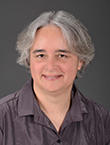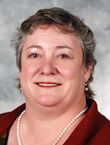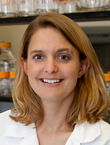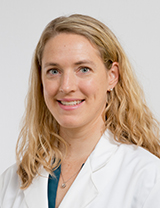Meetings
Meetings take place quarterly in conference room AG017A.
Voting Members
- Marja M. Hurley, M.D., Chair
- Rebecca A. Andrews, M.S., M.D., FACP
- Laurinda A. Jaffe, Ph.D.
- Liisa Kuhn, Ph.D.
- Sherene Mason, M.D., MBA, FAAP
- Nilanjana Maulik, Ph.D., FAHA
- Veronica Maria Pimentel, M.D., M.S., FACOG
- M. Melinda Sanders, M.D.
- Akua Sarfo, M.D., Ph.D.
- Pamela Taxel, M.D.
- Kristyn Zajac, Ph.D.
- Beiyan Zhou, Ph.D.
Voting Members
 Marja M. Hurley, M.D.
Marja M. Hurley, M.D.
Chair, GWIMS
Professor of Medicine, Division of Endocrinology and Metabolism
Professor of Orthopaedics, UConn Musculoskeletal Institute
Dr. Hurley received the Doctor of Medicine degree from the University of Connecticut. After completing a residency in internal medicine, she practiced internal medicine. Dr. Hurley returned to the UConn School of Medicine to pursue a fellowship in endocrinology with professor Lawrence Raisz and upon completion of the fellowship, joined the faculty. Dr. Hurley is currently professor of medicine and orthopaedic surgery in the UConn School of Medicine. Dr. Hurley is also a member of the graduate faculty in cell biology and skeletal craniofacial and oral biology.
Dr. Hurley is a widely published endocrinology researcher whose work has been supported by the National Institutes of Health (NIH) since 1989. Her lab has identified genes that may play a role in the development of osteoporosis. She lectures at conferences and national and international meetings, has written several textbook chapters on bone biology, and has published more than 60 peer-reviewed articles. In addition, she is a reviewer for leading endocrinology journals and serves on an NIH study section.
As a professor of medicine, Dr. Hurley lectures first- and second-year students, works closely with residents, and supervises graduate students and postdoctoral fellows. Dr. Hurley is the recipient of numerous awards, including Connecticut Technology Council 2010 Women of Innovation and Leadership Award and the 2011 University of Connecticut Health Center Board of Directors Faculty Recognition Award. Dr. Hurley was recently elected as a member of the Connecticut Academy of Science and Engineering.
Dr. Hurley is currently the associate dean for the Health Career Opportunity Programs at UConn Health. She has also held other major administrative positions at UConn Health including serving as interim senior associate dean for Education, chair of the School of Medicine Committee on Undergraduate Medical Education and chair of the Education Council. Dr. Hurley was appointed by Dr. Cato T. Laurencin, former vice president for Health Affairs and dean, to serve as the School of Medicine representative to the AAMC Group on Women in Medicine and Science. Dr. Hurley has mentored over forty high school, college, medical, dental, graduate, and postdoctoral students in her research laboratory, where more than 50 percent are women.
Rebecca A. Andrews, M.S., M.D., FACP
Professor of Medicine
Dr. Andrews studied biology at Boston College and medicine at the UConn School of Medicine where she also completed her residency. She is a professor of medicine and medical educator at UConn Health with a three-pronged position: primary care physician, director of Ambulatory Education, and associate program director for the Categorical Internal Medicine Residency Program.
Dr. Andrews also serves as UConn Health’s clinical lead for the Connecticut Comprehensive Pain Center and Patient-Centered Medical Home. She has had a national impact through her leadership roles (such as chair of the Board of Governors) with the American College of Physicians.
Her research and education involve developing innovative curricula that are combined with clinical experiences for enhanced adult learning. Areas of expertise outside of primary care include effective communication skills in challenging situations, pain management, and safe opioid prescribing. Additionally, Dr. Andrews works on tool development to predict/identify resident trainees who need urgent early intervention. She is actively involved in advocacy for the medical profession and patient care. Her two sons, an unabashed love of coffee and trivia, and half marathon training rule her world.
 Laurinda A. Jaffe, Ph.D.
Laurinda A. Jaffe, Ph.D.
Professor and Chair, Department of Cell Biology
Dr. Jaffe is chair of the Department of Cell Biology. She was a graduate student at University of California Los Angeles, and a postdoc at University of California San Diego. Research in the Jaffe Lab concerns the physiological events that initiate embryonic development, in particular the regulation of oocyte meiosis and the activation of eggs at fertilization. Over the past 15 years, the lab has focused on how membrane receptors and cyclic nucleotides function in the signaling pathways by which the somatic cells of the ovarian follicle control meiosis in the mammalian oocyte. Dr. Jaffe’s research was recognized by a MERIT Award from the National Institute of Child Health and Human Development (2014), and her research and mentoring contributions were recognized by the Pioneer in Reproduction Research Leadership Award sponsored by the Marine Biological Laboratory (Woods Hole), NICHD, and the Burroughs Welcome Fund (2017). Dr. Jaffe served on the National Institute of Health and Human Development Board of Scientific Counselors (2011-2016), and currently serves on the Scientific Advisory Board for the Max Planck Institute for Biophysical Chemistry in Gottingen, Germany (2017-2022).
 Liisa Kuhn, Ph.D.
Liisa Kuhn, Ph.D.
Associate Professor of Reconstructive Sciences
Center for Regenerative Medicine and Skeletal Development
Dr. Kuhn is a tenured associate professor in the Reconstructive Sciences Department, School of Dental Medicine. She is also core faculty in the Biomedical Engineering Department at the University of Connecticut-Storrs. She received her undergraduate degree in mechanical engineering at Duke University and worked at General Dynamics in San Diego, CA before completing her M.S. and Ph.D. in materials engineering at the University of California Santa Barbara. Dr. Kuhn held postdoctoral positions at Case Western University and Harvard Medical School/Boston Children’s Hospital, conducting biomineralization studies and orthopaedic research. She joined the faculty at UConn Health after co-founding and selling a start-up company in Boston, MA that developed bone graft substitutes.
Dr. Kuhn's research spans fundamental studies to translational research. She has an expertise in drug delivery and conducting in vitro and in vivo studies that she gained while working in industry and at UConn Health. The Kuhn Lab's mission is to use biomaterial technologies to develop better treatments for damaged or diseased tissue, particularly in the elderly.
 Sherene Mason, M.D., MBA, FAAP
Sherene Mason, M.D., MBA, FAAP
Assistant Professor of Pediatrics, UConn School of Medicine
Attending in Pediatric Nephrology, Connecticut Children’s
Dr. Mason completed her undergraduate degree at the University of Connecticut and earned a dual M.D. and Master of Business Administration degree from the University of Connecticut School of Medicine (UConn SOM). She later studied at Yale in General Pediatrics where she was elected as Pediatric chief resident in 2009-2010. As a Pediatric resident she was awarded funding by the American Academy of Pediatrics to design and implement an empowerment program for the families of the Yale Primary Care Center for Pediatrics. Further training at Yale University School of Medicine resulted in her subspecialty practice as a board-certified pediatric nephrologist. During her fellowship Dr. Mason completed research examining pathways important in renal tubular repair following renal injury. She was awarded the American Society of Pediatric Nephrology Fellow’s Research Award in Basic Science for her work. She is currently an attending physician at Connecticut Children’s and assistant Professor of pediatrics at the UConn SOM where she has helped to shape the career of future physicians.
She is committed to advancing the knowledge in childhood kidney diseases, co-authoring several peer-reviewed journal articles and, most recently a chapter on childhood lupus nephritis (LN) in an international textbook on pediatric kidney disease. She is a recipient of the Childhood Arthritis and Rheumatology Research Alliance (CARRA) grant to further clinical research in childhood LN. Research interests also include health disparities in the delivery of and access to care.
Her commitment to healthcare extends to board service to effect change: elected Board member for Connecticut Children's Specialty Group, Medical Advisory Board for the Connecticut Chapter of the National Kidney Foundation and Medical Advisory Council of Make-A-Wish Connecticut. Within her larger community Dr. Mason serves as a board member to the New Haven Innovation Collaborative (NHIC) and Read To Grow organizations and is a proud member of Sigma Gamma Rho Sorority, Inc., an international public service organization dedicated to improving the quality of life of women and families. Dr. Mason is also a member of the American Society of Pediatric Nephrology, the American Academy of Pediatrics, the American Society of Nephrology, and CARRA.
 Nilanjana Maulik, Ph.D., FAHA
Nilanjana Maulik, Ph.D., FAHA
Professor, Molecular Cardiology and Angiogenesis Laboratory
Department of Surgery
Nilanjana Maulik is a well-established and highly reputed cardiovascular scientist. Her research has advanced knowledge in the areas of angiogenesis and revascularization of the ischemic myocardium. Dr. Maulik received her Ph.D. in biochemistry in December 1990 from Calcutta University, India. After completion of her Ph.D., Dr. Maulik joined the Department of Surgery at UConn Health as a research fellow. She has continued her service there as a faculty member, and was promoted to tenured professor. Dr. Maulik also serves as a faculty member in the Cell Biology Graduate Program at UConn Health. She is heavily involved in NIH-funded research and serves as an expert in the field in the NIH study sections; she frequently gives invited lectures at national and international scientific conferences. Dr. Maulik’s current research focuses on understanding the basic molecular mechanism of myocardial angiogenesis in the ischemic tissue and is directed toward understanding the program for the expression of survival and growth factors involved in arteriogenesis and collateral growth in cardiovascular (CAD) and peripheral artery disease (PAD). She has trained more than 100 scientists (M.Sc.s, M.D.s, Ph.D.s), most of whom are actively engaged in professional careers all over the world.
Dr. Maulik is member of several prestigious societies including the Federation of American Societies for Experimental Biology (FASEB), American Heart Association (AHA), International Society of Heart Research (ISHR), American College of Nutrition (ACN), and International College of Angiology (ICA). She has served as a member of the Myocardial Ischemia Metabolism (MIM) study section of NIH and of the NHLBI Program Project Review Committee for several years. Presently, Dr. Maulik serves as a reviewer for several special-emphasis panel study sections of NIH. She is on the editorial boards of several major cardiovascular journals and served as editor-in-chief of the prestigious journal Molecular Biology Reports (Springer Press). She is a fellow of the International Academy of Cardiovascular Sciences (Canada), ACN, and AHA. She has published more than 190 original peer-reviewed articles and almost 35 book chapters. She has also edited three books on epigenetics, nutrition, and cardiovascular diseases for CRC (Springer Press). Lastly, Dr. Maulik has organized several international conferences and symposia.
 Veronica Maria Pimentel, M.D., M.S., FACOG
Veronica Maria Pimentel, M.D., M.S., FACOG
Assistant Professor of Obstetrics and Gynecology
Dr. Veronica Maria Pimentel is an assistant professor of obstetrics and gynecology at the University of Connecticut School of Medicine and the Frank H. Netter MD School of Medicine at the Quinnipiac University. She is a board-certified maternal-fetal medicine specialist, the director of Diabetes in Pregnancy Program, the director of research for the Obstetrics and Gynecology Residency Program and the course director for the Maternal-Fetal Medicine Sub-Internship at Trinity Health Of New England.
Dr. Pimentel obtained her maternal-fetal medicine fellowship training at the Albert Einstein College of Medicine in New York and completed her OB/GYN residency at Boston University Medical Center. She is a graduate of the UConn School of Medicine. Prior to entering medical school, she obtained a Master of Science degree at Purdue University.
Dr. Pimentel has many publications and is the primary investigator for several research projects. She has presented at international, national, and local conferences. She is a member of the Trinity Health Of New England Scientific Committee. She is the research and clinical mentor of several medical students and resident physicians.
Dr. Pimentel's leadership extends beyond the hospital. She is a member of the American College of Obstetricians and Gynecologists (ACOG) Scientific Program Committee. Additionally, she is the treasurer for the Connecticut Chapter of the National Medical Association and is a board member of the Cabo Verdean American Medical Society.
Dr. Pimentel is a strong advocate for maternal and child health. She serves in the Connecticut Maternal-Child Health Subcommittee. Throughout the years, she has collaborated with professional organizations, such as ACOG and the Society of Maternal-Fetal Medicine (SMFM) as well as national, state and community stakeholders, including the March of Dimes. Notably, she has worked closely with ACOG to recognize the contributions of enslaved Black women to the field of obstetrics and gynecology. She is the visionary of Betsey, Lucy, and Anarcha Days (February 28 - March 1), the enslaved Black women experimented on by Dr. Marion Sims in the name of advancing science.
Dr. Pimentel's advocacy and leadership is being recognized. She is a 2021 National Association of Health Services Executives CT C-Suite Honoree for championing equity and health services delivery for immigrant populations. She is also a 2022 Robert C. Cefalo National Leadership Fellow.
Dr. Pimentel's passion is to mobilize the combining power of clinical care, education, and research to advocate for moms and babies and close the health disparity gap.
 M. Melinda Sanders, M.D.
M. Melinda Sanders, M.D.
Professor of Pathology and Laboratory Medicine
Director, Surgical and Cytology Services
Dr. Sanders is a professor of pathology and laboratory medicine. She graduated from the University of Toledo School of Medicine, pursued anatomic pathology training at Yale-New Haven Hospital and fellowship training in anatomic and cytopathology at Memorial Sloan-Kettering Cancer Center. Her clinical and research activities center on gynecologic pathology. She also directs the Mechanisms of Disease course for second year medical and dental students.
She is currently serving as chair of the Academy of Distinguished Educators at UConn Health.
 Akua Sarfo, M.D., Ph.D.
Akua Sarfo, M.D., Ph.D.
Assistant Professor of Dermatology
Akua Sarfo, M.D., Ph.D., is an assistant professor of dermatology at UConn Health. She practices general dermatology with a clinical area of interest in hidradenitis suppurativa. She completed her undergraduate studies at the University of Pittsburgh, earning a bachelor of science degree majoring in biological sciences and urban studies. She earned her M.D. and Ph.D. degrees at Penn State College of Medicine where her thesis research focused on herpes simplex virology. She then went on to complete her dermatology residency at the University Hospitals of Cleveland/Case Western Reserve program, serving as a chief resident in her final year.
 Pamela Taxel, M.D.
Pamela Taxel, M.D.
Associate Professor of Medicine
Division of Endocrinology and Metabolism
Dr. Taxel is an associate professor in the Department of Medicine, Division of Endocrinology and Metabolism at UConn Health. She received her medical degree from the State University of New York at Downstate College of Medicine. She completed her residency in internal medicine at the University of South Florida and UConn School of Medicine. She went on to specialty training in geriatrics, as well as endocrinology and metabolism, at the UConn School of Medicine.
Currently, she serves as the fellowship director in Endocrinology and Metabolism. Her clinical area of focus is in the treatment of patients with osteoporosis, with a special interest in the treatment of men and women receiving cancer therapies that impact bone health. She collaborates with School of Dental Medicine colleagues in several research projects including a study assessing the impact of bone health on implant success or failure, as well as another project on the identification of risk factors for osteonecrosis of the jaws in patients receiving bone-modifying therapies for advanced cancers.
 Kristyn Zajac, Ph.D.
Kristyn Zajac, Ph.D.
Assistant Professor of Medicine
Dr. Zajac is an assistant professor of medicine in the Calhoun Cardiology Center, Behavioral Cardiovascular Prevention Division, at UConn Health. She earned her doctorate in clinical psychology from the University of Delaware in 2009. She completed her predoctoral clinical internship and an NIH-funded postdoctoral research fellowship at the Medical University of South Carolina’s (MUSC) National Crime Victims Research and Treatment Center in Charleston, South Carolina. Prior to her appointment at UConn Health, she was an assistant professor at the Family Services Research Center in MUSC’s Department of Psychiatry and Behavioral Sciences, and she served as the director of MUSC’s Adolescent and Family Services clinic.
Dr. Zajac’s research focuses on the development and evaluation of interventions for substance abuse and mental health disorders among high-risk adolescents and young adults. She currently has a K23 Career Development Award from the National Institute on Drug Abuse to develop and evaluate an integrated treatment for substance abuse and posttraumatic stress disorder among high-risk emerging adults. Her work has also been funded by the National Institute of Mental Health and the American Psychological Foundation.
 Beiyan Zhou, Ph.D.
Beiyan Zhou, Ph.D.
Professor of Immunology
Department of Immunology
Dr. Zhou is a professor of immunology and a member of the Institute for Systems Genomics at UConn Health. She received her Ph.D. from Northwestern University, Interdisciplinary Biological Sciences Graduate Program (IBiS) with Dr. Daniel Linzer, followed by postdoc training at Whitehead Institute/MIT where she investigated the regulatory mechanisms of microRNAs in hematopoiesis and other tissue stem cells, mentored by Dr. Harvey Lodish. She joined UConn Health in 2015 as a tenured associate professor in the Department of Immunology. She is an active member of the American Heart Association and received the Junior Faculty Award from the American Diabetes Association, Women of Innovation 2020 from the Connecticut Technology Council and Connecticut Center for Advanced Technology, and was recently selected to the Connecticut Academy of Science of Engineering.
Her research program focuses on understanding the regulatory mechanisms of immune cells in chronic diseases, including metabolic syndromes, cardiovascular diseases, and aging. Incorporating cell culture, animal models, and human samples, her group applied multiomics investigation strategies for an in-depth understanding of the causal regulatory mechanisms. Work from her lab has contributed to the first discovery of miR-150 as a potent regulator for B-cell formation from hematopoietic stem cells, and their function under normal, obese, and cancerous transformation; and miR-223 as a potent regulator of macrophage polarization. In addition to experimental investigation, her group recently developed new bioinformatics programs incorporating single-cell transcriptome technology to allow high-resolution fine-mapping of immune cell function in diseases.
Past Members
 Biree Andemariam, M.D.
Biree Andemariam, M.D.
Assistant Professor of Medicine
Dr. Andemariam received her undergraduate degree from Princeton University and medical degree from Tufts University School of Medicine where she graduated with research honors. She joined the faculty of the University of Connecticut School of Medicine in 2007 in the Division of Hematology and Oncology. Dr. Andemariam is an expert in the management of malignant and non-malignant hematologic disorders. In 2010, she developed the region’s only clinical and research center for adults with sickle cell disease. Her research focuses on understanding the mechanisms involved in increased susceptibility to infection in sickle cell disease. Her work is fundamentally translational in that she conducts her research in both human subjects and by utilizing a mouse model of sickle cell disease.
Dr. Andemariam completed her internal medicine residency and hematology/oncology fellowship training at New York-Presbyterian Hospital – Weill Medical College of Cornell University in New York City. She has received several research honors including an Amgen Research Fellowship Award for her work in treating refractory and relapsed lymphoma, a Clinical Research Feasibility Fund Award for her research in hemophilia, and a Ruth L. Kirschstein National Research Service Award. She was also a Howard Hughes Medical Institute Research Scholar. Her current work is supported by the Connecticut Institute for Clinical and Translational Science K12 Program, the Connecticut Department of Public Health, and Lea’s Foundation for Leukemia Research, Inc.
 Rashmi Bansal, Ph.D.
Rashmi Bansal, Ph.D.
Professor of Neuroscience
Dr. Bansal is a professor of neuroscience at the UConn School of Medicine. She received her Ph.D. in biochemistry from the Central Drug Research Institute in Lucknow, India. Her current research is focused on the role of growth factor signaling in oligodendrocyte development and axon-glial interaction leading to myelination under normal and pathological conditions. She is an author on numerous articles published in forefront journals. She is an associate editor for the Journal of Neuroscience Research. She serves on several committees including the NIH grants review group, the International and American Societies of Neurochemistry and the Councils of the American Society for Neurochemistry and the Asia Pacific Society for Neurochemistry.
 Stormy Chamberlain, Ph.D.
Stormy Chamberlain, Ph.D.
Assistant Professor of Genetics and Developmental Biology
Dr. Chamberlain is the Raymond and Beverly Sackler assistant professor of genetics and developmental biology at UConn Health and a member of the UConn Stem Cell Institute. Her lab studies chromosome 15q11-q13 imprinting disorders, and has been focusing on induced pluripotent stem cell models of these diseases. Dr. Chamberlain received a B.A. degree in molecular biology from Princeton University and a Ph.D. in medical sciences-genetics from the University of Florida, where she studied mouse models of Prader-Willi syndrome. She was a postdoc with Terry Magnuson, Ph.D., at the University of North Carolina studying the role of Polycomb Repressive Complex 2 in the epigenetic regulation of stem cell pluripotency before completing a second short postdoc with Marc Lalande, Ph.D., at UConn Health.
 Anjanette Ferris, M.D., M.P.H.
Anjanette Ferris, M.D., M.P.H.
Assistant Professor of Medicine
Dr. Ferris earned her Doctorate in Medicine from the State University of New York at Downstate College of Medicine, and completed her postdoctoral training at Columbia University Medical Center in New York City, including a residency in internal medicine, fellowship in cardiology, and research fellowship in preventive cardiology. She also holds a Master of Public Health Degree from Columbia.
Dr. Ferris was co-author of “Tracking Women’s Awareness of Heart Disease: An American Heart Association National Study,” a major driving force behind the development of the Association’s “Go Red for Women” heart disease awareness campaign. She is also the lead author of the article, “American Heart Association and American Stroke Association National Survey of Stroke Risk Awareness Among Women.” Dr. Ferris is a recipient of the Trudy Bush Fellowships for Cardiovascular Disease Research in Women’s Health Award and the American College of Cardiology Career Development Award in Women’s Cardiovascular Health.
Dr. Ferris is a member of Phi Beta Kappa Honor Society, American Heart Association, American College of Cardiology, Association of Black Cardiologists, and the National Medical Association. She currently serves as a national spokesperson for the American Heart Association.
 Gloria Gronowicz, Ph.D.
Gloria Gronowicz, Ph.D.
Professor of Surgery
Dr. Gronowicz received her Ph.D. in cell biology from Columbia University and completed a postdoctoral fellowship in biochemistry at the University of Chicago and then a second postdoctoral fellowship in bone biology with Dr. Gideon Rodan at UConn Health. She joined the Department of Orthopaedics as an assistant professor and worked her way to tenured professor in orthopaedics. In 2007 she joined the Department of Surgery as her primary department with a secondary appointment in Orthopaedics.
Dr. Gronowicz has over 100 publications in peer-reviewed journals and has been supported continuously by grant support from NIH and foundations since 1987. Her research encompasses tissue engineering, osteoporosis, aging, integrative medicine therapies and deafness with an emphasis on bone biology aspects of these topics. She has served on study sections for NIH and NASA. She was the Co-Chair of Bone Topic for the Orthopaedic Research Society meetings from 2011-2014. Dr. Gronowicz is the past Chairman of the Skeletal Cranial Facial and Oral Biology (SCOB) graduate program, and continues to teach in graduate, dental and medical school courses.
Dr. Gronowicz has had a life-long commitment to women issues in science. She chaired the Working Group on the Status of Women Faculty at UConn Health, which culminated in a 1994 document on women salaries, which was approved by both Medical and Dental School Councils and resulted in adjustments to all women salaries. She is a member of the Women’s Leadership Committee of the Orthopaedic Research Society and chaired their annual scientific workshop on Bone Histology and Histomorphometry.
 Marilyn A. Katz, M.D.
Marilyn A. Katz, M.D.
Associate Professor of Medicine
Dr. Katz is an associate professor of medicine and faculty co-chair of student affairs at the UConn School of Medicine. She obtained her undergraduate degree from the University of Pennsylvania School of Engineering and Applied Science and medical degree at the UConn School of Medicine. She completed the primary care track within the UConn categorical Internal Medicine Residency Program and specializes in primary care. Her interests include perioperative medicine, preventative health, chronic disease management, physician wellness, and medical education.
 Camelia Lawrence, M.D., FACS
Camelia Lawrence, M.D., FACS
Assistant Professor of Surgery, UConn School of Medicine
Director of Breast Surgery, The Hospital of Central Connecticut and Midstate Medical Center
Dr. Lawrence is a board-certified surgeon specializing in benign and malignant breast disease. She has fellowship training in advanced breast cancer surgery, including skin- and nipple-sparing mastectomy, sentinel node biopsy and oncoplastic techniques.
She earned her bachelor’s degree from Fordham University and her medical degree from the University of Rochester School of Medicine. She completed her residency at New York Medical College and then entered her fellowship training in breast surgical oncology at the John Wayne Cancer Institute in Santa Monica, CA. She currently serves as director of breast surgery for The Hospital of Central Connecticut and Midstate Medical Center, responsible for further developing their breast programs.
She serves as assistant professor of surgery at the University of Connecticut School of Medicine, where she works with medical students and surgical residents, nurturing her personal interest in teaching the future generation. She holds membership in the American College of Surgeons, the American Society of Breast Surgeons and the American Society of Surgical Oncologists.
Dr. Lawrence co-authored a book chapter entitled “Benign Breast Diseases,” published in Berek and Novak’s Gynecology, 2012. She has served as a peer-reviewer for journals, and her scholarly activities have yielded abstracts, poster presentations and papers. Her research interests span a wide array of topics related to breast health, including findings related to health disparities in breast cancer. Additionally, she has traveled to South Africa as a delegate from the United States for the Annual AORTIC conference on “Cancer in Africa: Bridging Science and Humanity.”
Commitment to public service has earned Dr. Lawrence numerous awards, including the 2020 Denise Taft Davidoff Empowerment Award for Mid-Fairfield County Dress for Success, the Dr. Kenneth Woodard Memorial Award, Rush-Henrietta Rotary Club’s Dr. Edwin Robinson Humanitarian Award and the Carrie-Ann Smith Award. In 2015, the Urban League of Southern Connecticut chose her to receive the Woman of Power Award during its Women’s Empowerment Summit. She also was awarded the 2017 Doctor of Distinction Award for Fairfield County, the American Cancer Society Award for Women Leading the Way to Wellness and the Susan G. Komen Inaugural More Than Pink Honor for her commitment to breast cancer care. More recently, she received the 100 Women of Color Award in Hartford and the Southern Connecticut Black Chamber of Commerce Business Woman of the Year Award.
 Sun-Kyeong Lee, Ph.D.
Sun-Kyeong Lee, Ph.D.
Assistant Professor of Medicine
UConn Center on Aging
Dr. Lee is an assistant professor in the UConn Center on Aging at the UConn School of Medicine. Dr. Lee received her undergraduate degree from Korea University and her postdoctoral degree from the University of Connecticut. She has conducted basic osteoclast biology research at UConn Health for the last 20 years, initially as a postdoctoral fellow and an independent investigator. Dr. Lee's research activities include studying the role of cytokines and hormones in the regulation of bone resorption and formation with the hope of providing new and improved therapies for the treatment of osteoporosis. She also studies the role of macrophage migration inhibitory factor (MIF) and their receptors in the development and function of osteoclasts. One of Dr. Lee's major academic activities includes mentoring Ph.D. students, dental master's degree students and postdoctoral fellows. She is also a member of the skeletal, craniofacial and oral biology graduate program at UConn Health.
 Naomi Rothfield, M.D.
Naomi Rothfield, M.D.
Professor of Medicine
Dr. Naomi Rothfield, professor of medicine in the Division of Rheumatology at UConn Health. She is an internationally renowned rheumatologist with special expertise in the management of systemic lupus ematosus, scleroderma and Raynaud’s disease. Dr. Rothfield has published over 100 papers on rheumatologic diseases and her clinical research involves the investigation of new therapies to enhance the care of patients with scleroderma, SLE and Raynaud’s disease.
 Linda Shapiro, Ph.D.
Linda Shapiro, Ph.D.
Associate Professor of Cell Biology
Center for Vascular Biology
Dr. Shapiro is an associate professor of cell biology and director of the Center for Vascular Biology at UConn Health. Dr. Shapiro obtained her undergraduate degree at the University of Notre Dame and her Ph.D. from the University of Michigan. She was a faculty member at St. Jude Children’s Research Hospital prior to joining the UConn Center for Vascular Biology in 2001 and was selected as director in 2010. Dr. Shapiro is former director of the cell biology area of concentration and has mentored numerous postdoctoral fellows, graduate and dual degree students.
Her laboratory's research focuses on the function of cell surface peptidases in inflammation and angiogenesis with particular emphasis on cancer and cardiovascular disease. She has published numerous research articles and her work has been funded since 1995 by grants from the National Institutes of Health, Department of Defense, Connecticut Stem Cell Initiative, Prostate Cancer Foundation and the Komen Foundation. She is a former member of the Atherosclerosis and Inflammation in the Cardiovascular System NIH study section and is currently a member of the editorial board of the Journal of Biological Chemistry.
